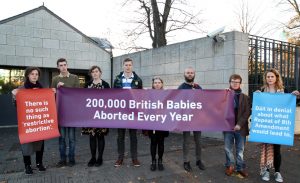
By Katie Ascough - 26 June, 2020

The tragedy of the UK’s 1967 Abortion Act commemorated with a vigil by the Pro Life Campaign (Photo: John McElroy)
According to Right to Life UK, campaigners are relieved that a radical abortion clinic censorship zone motion brought forward by Dr Rupa Huq, which passed by 213 to 47 votes, is unlikely to become law.
The motion seeks to introduce censorship zones around abortion clinics in England and Wales. However, as it is a Ten Minute Rule Motion* it is very unlikely it will be given further time by the Government to be debated in Parliament and it is even less likely that it will become law.
Censorship zones would effectively ban volunteers from offering practical and emotional support to women entering abortion clinics across England and Wales. They would also ban individuals from peacefully praying in the vicinity of clinics.
In 2017 former Home Secretary Amber Rudd launched a review into the scale and nature of pro-life vigils outside abortion clinics to establish if the UK Government would recommend the introduction of censorship zones. In the investigation continued by the succeeding Home Secretary Sajid Javid, over 2,500 responded to a call for evidence, including abortion service providers, abortion service clients, those engaging in anti-abortion demonstrations, police forces and local authorities.
In 2018, Sajid Javid announced that the Home Office did not find adequate reason to introduce censorship zones, stating that: “… introducing national buffer zones would not be a proportionate response, considering the experiences of the majority of hospitals and clinics, and considering that the majority of activities are more passive in nature. In making my decision, I am also aware that legislation already exists to restrict protest activities that cause harm to others.”
Opposition to censorship zones goes beyond pro-life advocates to a large part of society, which may not agree on the pro-life position on abortion, but oppose censorship zones because they infringe on free speech. A number of prominent human rights groups and campaigners, all of whom support abortion, have also spoken out against the introduction of censorship zones. This includes Peter Tatchell, the Manifesto Club, Big Brother Watch, Index on Censorship and the Freedom Association.
The Be Here for Me website highlights just some of the many stories of women who have been helped by people outside abortion clinics and the stories of future women who could miss out on such support in the future. One mother who kept her daughter as a result of the pro-life support she received outside an abortion clinic in Ealing will soon challenge the use of ‘criminalised free speech zones’ at the European Court of Human Rights. Alina Dulgheriu launched the legal challenge because she wants other potential mothers to receive the same practical and emotional support she was offered – support which led to her keeping her daughter, Sarah.
Spokesperson for Right to Life UK, Catherine Robinson, said: “As this vote was on a Ten Minute Rule Motion, it is very unlikely it will be given further time by the Government to be debated in Parliament. It is even less likely that it will become law. By attempting to restrict where women facing unplanned pregnancies can receive compassionate, emotional, and practical support, the ‘pro-choice’ lobby are removing real choice for women and revealing they’re really just pro-abortion.
“Today, many babies are alive because their mothers were able to get the help they needed outside of an abortion clinic. We would, therefore, encourage the government not to give this bill any more time. In doing so they would send a clear signal that women should not be denied the choice of life-saving support for them and their baby.”
A similar political battle against abortion exclusion zones is currently being fought in Ireland. Recently Fianna Fáil and the Green Party negotiating teams have joined Fine Gael in supporting the introduction of ‘censorship zones’ that, according to the Pro Life Campaign, breach civil liberties.
* Ten Minute Rule Bills are a type of Private Members’ Bill introduced in the House of Commons that allows a backbench MP to make his or her case for a new bill in a speech lasting up to ten minutes. An opposing speech may also be made before the House decides whether or not the bill should be introduced. If the MP is successful the bill is taken to have had its first reading.